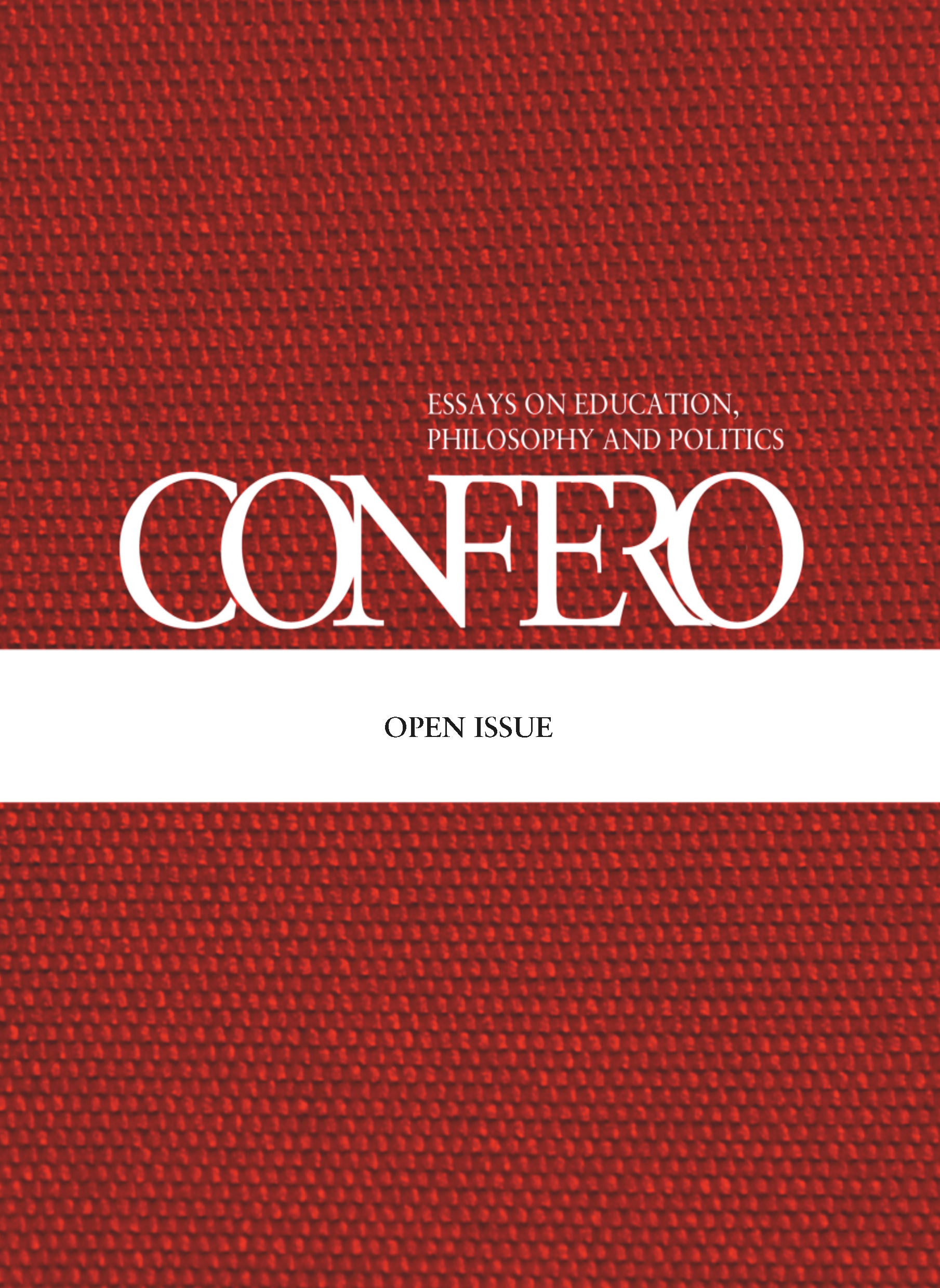Why agonists should stop discussing with deliberative theorists
DOI:
https://doi.org/10.3384/confero.2001-4562.210903Abstract
No abstract available.
References
Abizadeh, A. (2005) Does Collective Identity Presuppose an Other? On the Alleged Incoherence of Global Solidarity. The American Political Science Review, 99(1), 45-60.
Arendt, H. (1958). The Human Condition. Chicago: The University of Chicago Press.
Bergdahl, L. (2010). Seeing Otherwise. Renegotiating Religion and Democracy as Questions for Education. (Doctoral thesis, Department of Education, 168). Stockholm: Stockholm University.
Connolly, W. E. (1993). The Terms of Political Discourse. Oxford: Blackwell.
Dewey, J. (1927). The Public and Its Problems. Athens: Swallow Press, Ohio State University Press.
Englund, T. (2016). On Moral Education Through Deliberative Communication. Journal of Curriculum Studies, 48(1), 58-76.
Erman, E. (2009). What is Wrong with Agonistic Pluralism? Reflections on Conflict in Democratic Theory. Philosophy and Social Criticism, 35(9), 1039-1062.
Glover, R. W. (2012). Games without Frontiers? Democratic Engagement, Agonistic Pluralism and the Question of Exclusion. Philosophy and Social Criticism, 38(1), 81-104.
Honig, B. (1993). Political Theory and the Displacement of Politics. Ithaca: Cornell University Press.
Koutsouris, G.; Stentiford, L.; Benham-Clarke, S. & Hall, D. (2021). Agonism in Education: A Systematic Scoping Review and Discussion of its Educational Potential. Educational Review.
Laclau, E. (2007). On Populist Reason. London: Verso.
Laclau, E. & Mouffe, C. (2001). Hegemony and Socialist Strategy. Towards a Radical Democratic Politics. London: Verso.
Leiviskä, A. & Pyy, I. (2020). The Unproductiveness of Political Conflict in Education: A Nussbaumian Alternative to Agonistic Citizenship Education. Journal of Philosophy of Education.
Ljunggren, C. (1996). Medborgarpubliken och det offentliga rummet. Om utbildning, medier och demokrati [The Citizenpublic and the Public Sphere. On Education, Media and Democracy] (Doctoral thesis, Uppsala Studies in Education 68). Uppsala: Acta Universitatis.
Ljunggren, C. (1999a). Questions on Identity and Education. Democracy Between Past and Future (47-60). In C.A. Säfström (Ed.) Identity. Lund: Studentlitteratur.
Ljunggren, C. (1999b). Identitet som konstitutivt handlande [Identity as Constitutive Action]. Utbildning & Demokrati, 8(1), 63-87.
Ljunggren, C. (2007). Utbildning som politisk kommunikation - om deliberation och agonism. [Education as political communication - on deliberation and agonism]. In T. Englund (Ed.), Utbildning som kommunikation. Deliberativa samtal som möjlighet. [Education as communication. Deliberative communication as a possibility] (205-239). Gothenburg, SE: Daidalos.
Ljunggren, C. (2010). Agonistic Recognition in Education: On Arendts Qualification of Political and Moral Meaning. Studies in Philosophy and Education, 29(1), 19-33.
Marder, M. (2010). Groundless Existence: The Political Ontology of Carl Schmitt. New York: Continuum.
Mouffe, C. (1999a). Carl Schmitt and the Paradox of Liberal Democracy. In C. Mouffe (Ed.), The Challenge of Carl Schmitt (38-52). London: Verso.
Mouffe, C. (1999b). Deliberative Democracy or Agonistic Pluralism? Social Research, 66(3), 745-758.
Mouffe, C. (2000). The Democratic Paradox. London, UK: Verso.
Mouffe, C. (2005). On the Political. London, UK: Verso.
Pitkin, H. F. (1998). The Attack of the Blob: Hannah Arendts concept of the social. Chicago: The University of Chicago Press.
Sandel, M. (2006). Public Philosophy: Essays on Morality in Politics. Harvard, MA: Harvard University Press.
Samuelsson, M. (2018). Education for Deliberative Democracy and the Aim of Consensus. Democracy & Education, 26(1), Article 2.
Schaap, A. (2007). Political Theory and the Agony of Politics. Political Studies Review, 5(1), 56-74.
Schmitt, C. (1932/2007). The concept of the political. Chicago: University of Chicago Press.
Tryggvason, Á. (2017). The Political as Presence: On Agonism in Citizenship Education. Philosophical Inquiry in Education, 24(3), 252-265.
Tryggvason, Á. (2018a). Democratic Education and Agonism. Exploring the Critique from Deliberative Theory. Democracy & Education, 26(1), Article 1.
Tryggvason, Á. (2018b). Om det politiska i samhällskunskap. Agonism, populism och didaktik [On the Political in Social Science Education. Agonism, Populism and Didactics] (Doctoral thesis, Örebro Studies in Education 58 and Örebro Studies in Educational Sciences with an Emphasis on Didactics 17). Örebro: Örebro universitet.
Tryggvason, Á. (2019). How to End a Discussion: Consensus or Hegemony? Democracy & Education, 27(2), Article 5.
Zembylas, M. (2018). Political Emotions in the Classroom. How Affective Citizenship Education Illuminates the Debate Between Agonists and Deliberators. Democracy & Education, 26(1), Article 6.
Downloads
Published
Issue
Section
License
Copyright (c) 2021 Ásgeir Tryggvason

This work is licensed under a Creative Commons Attribution 4.0 International License.
As Confero is an open access journal, this means that anyone who can access the Internet can freely download and read the journal. There are no commercial interests for Linköping University Electronic Press or Confero in publishing the journal.
The core idea of open access is that copyright remains with the author(s). However, we publish with the agreement of the author that if she or he decides later to publish the article elsewhere, that the publisher will be notified, prior to any acceptance, that the article has already been published by Confero.
When publishing with Confero, it is with the agreement of the author that if they make their article available elsewhere on the internet (for example, on their own website or an institutional website), that they will do so by making a link to the article as published in Confero using the Digital Object Identifier (DOI) number of the article and acknowledge in the text of the site that the article has been previously published in Confero.
As evident by the markers on our homepage, Confero falls under the Creative Commons licence abbreviated BY. This means that we allow others to use, spread and elaborate on the published articles, as long as they acknowledge who published it and where it was originally published.



